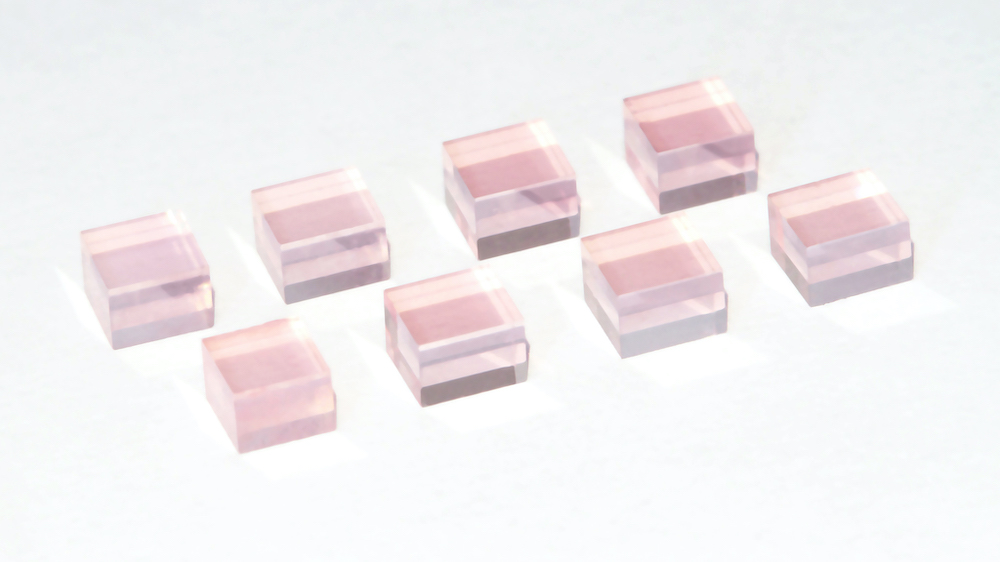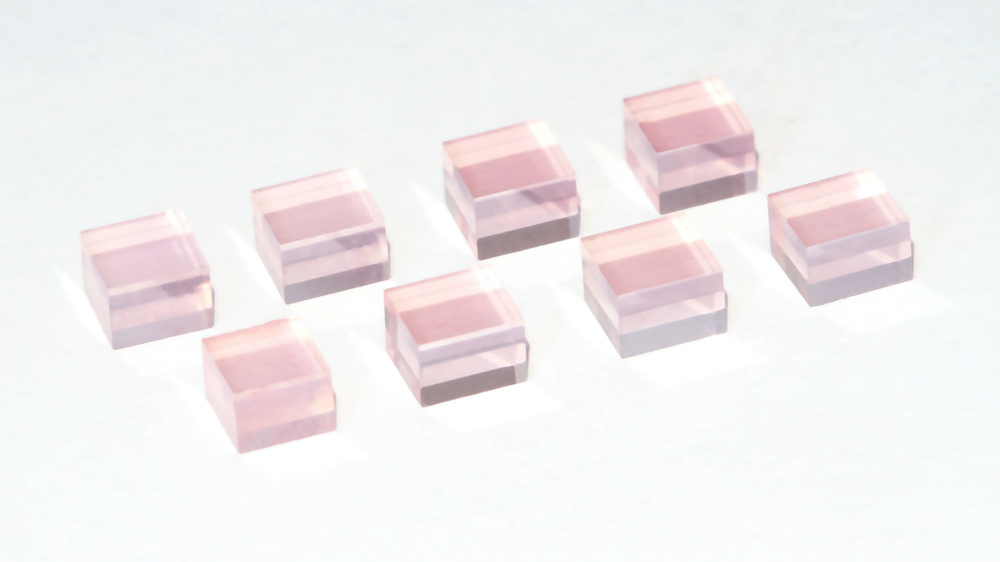
Element Six, part of the De Beers Group, is launching its first commercially-available, general-purpose chemical vapour deposition (CVD) quantum grade diamond, DNV-B1TM.
DNV-B1TM, the first solution in Element Six’s new DNVTM Series, is an ideal starting material for those interested in researching nitrogen-vacancy (NV) ensembles for quantum demonstrations, masers, detection of RF radiation, gyroscopes, sensing and further projects. Building on the company’s extensive experience and a unique, patented process to develop bespoke CVD diamond solutions, DNV-B1TM is the first widely-available, general-purpose quantum grade material.
Diamond NV (DNV) centres offer researchers a unique solid-state platform with spin qubits that can be initialised and read out at room temperature, with long qubit lifetimes. These properties stem from diamond’s unique structure and strong bonds.
Element Six’s DNV-B1TM is developed to provide a baseline solution that contains a uniform density of NV spin centres. It is specifically designed for emerging diamond applications that require ensembles of NV centres, guaranteeing a minimum level of performance.
DNV-B1TM contains optimised nitrogen vacancy defects that will lower the barriers for the adoption of diamond in research and development for quantum applications, unlocking a new generation of diamond-enabled quantum technologies.
Matthew Markham, Principal Scientist, said “Growing diamond by chemical vapour deposition means that, firstly, my team can controllably and reproducibly dope the grown diamond with nitrogen. Then, following subsequent irradiation and annealing steps, they are able to produce a diamond that contains a uniform and repeatable NV spin centre concentration with spin lifetimes of a microsecond”.
This is just one of the many disruptive innovations introduced by Element Six, who pioneered the development of single crystal diamond using the CVD method in the early 2000s. With production facilities in the UK and California, the company has been at the forefront of a range of new developments in CVD diamond synthesis and associated industrial applications. Its patented technologies also drive a new production facility in Oregon, to supply gem-quality stones to Lightbox Jewelry.
Working closely with a network of global collaborators, Element Six’s engineered diamond research has accelerated the delivery of many breakthroughs in quantum research, including:
• In 2012, Harvard reported isotopically engineered CVD single crystal achieved spin coherence times of seconds at room temperature
• Alongside Delft University of Technology in 2015, Element Six material enabled the first successful loophole-free Bell’s inequality test, proving for the first time that ‘spooky action at a distance’ is real. This also marked a significant technology step toward a quantum-secure enabled network
• In 2018, Imperial College London utilised engineered single crystal material in the development of the world’s first continuous-wave, room-temperature, solid-state MASER (microwave amplification by stimulated emission of radiation)
• Lockheed Martin’s 2019 Dark Ice program delivered a DNV-enabled magnetometer that measured the direction and strength of nearly imperceptible magnetic field anomalies, opening up diamond-based quantum devices in GPS-denied navigation applications
Dr Daniel Twitchen, Chief Technologist, said “I find it remarkable that these perfectly imperfect diamonds offer so many opportunities in quantum-enabled applications. The field of synthetic diamond is moving quickly, but by working with its global network and leveraging its R&D heritage, Element Six has optimised synthesis and post-synthesis processing with control at the part-per-billion level. We hope that this general-purpose DNV-B1TM grade will be the first of a long, successful DNVTM Series that solves new problems across diverse areas in the consumer, defence and medical markets.”
To read more https://www.e6.com/en/about/News/Diamond-quantum-revolution
DNV-B1TM, the first solution in Element Six’s new DNVTM Series, is an ideal starting material for those interested in researching nitrogen-vacancy (NV) ensembles for quantum demonstrations, masers, detection of RF radiation, gyroscopes, sensing and further projects. Building on the company’s extensive experience and a unique, patented process to develop bespoke CVD diamond solutions, DNV-B1TM is the first widely-available, general-purpose quantum grade material.
Diamond NV (DNV) centres offer researchers a unique solid-state platform with spin qubits that can be initialised and read out at room temperature, with long qubit lifetimes. These properties stem from diamond’s unique structure and strong bonds.
Element Six’s DNV-B1TM is developed to provide a baseline solution that contains a uniform density of NV spin centres. It is specifically designed for emerging diamond applications that require ensembles of NV centres, guaranteeing a minimum level of performance.
DNV-B1TM contains optimised nitrogen vacancy defects that will lower the barriers for the adoption of diamond in research and development for quantum applications, unlocking a new generation of diamond-enabled quantum technologies.
Matthew Markham, Principal Scientist, said “Growing diamond by chemical vapour deposition means that, firstly, my team can controllably and reproducibly dope the grown diamond with nitrogen. Then, following subsequent irradiation and annealing steps, they are able to produce a diamond that contains a uniform and repeatable NV spin centre concentration with spin lifetimes of a microsecond”.
This is just one of the many disruptive innovations introduced by Element Six, who pioneered the development of single crystal diamond using the CVD method in the early 2000s. With production facilities in the UK and California, the company has been at the forefront of a range of new developments in CVD diamond synthesis and associated industrial applications. Its patented technologies also drive a new production facility in Oregon, to supply gem-quality stones to Lightbox Jewelry.
Working closely with a network of global collaborators, Element Six’s engineered diamond research has accelerated the delivery of many breakthroughs in quantum research, including:
• In 2012, Harvard reported isotopically engineered CVD single crystal achieved spin coherence times of seconds at room temperature
• Alongside Delft University of Technology in 2015, Element Six material enabled the first successful loophole-free Bell’s inequality test, proving for the first time that ‘spooky action at a distance’ is real. This also marked a significant technology step toward a quantum-secure enabled network
• In 2018, Imperial College London utilised engineered single crystal material in the development of the world’s first continuous-wave, room-temperature, solid-state MASER (microwave amplification by stimulated emission of radiation)
• Lockheed Martin’s 2019 Dark Ice program delivered a DNV-enabled magnetometer that measured the direction and strength of nearly imperceptible magnetic field anomalies, opening up diamond-based quantum devices in GPS-denied navigation applications
Dr Daniel Twitchen, Chief Technologist, said “I find it remarkable that these perfectly imperfect diamonds offer so many opportunities in quantum-enabled applications. The field of synthetic diamond is moving quickly, but by working with its global network and leveraging its R&D heritage, Element Six has optimised synthesis and post-synthesis processing with control at the part-per-billion level. We hope that this general-purpose DNV-B1TM grade will be the first of a long, successful DNVTM Series that solves new problems across diverse areas in the consumer, defence and medical markets.”
To read more https://www.e6.com/en/about/News/Diamond-quantum-revolution




 IonQ Achieves Industry Leading Performance on Next Generation Barium Qubits
IonQ Achieves Industry Leading Performance on Next Generation Barium Qubits